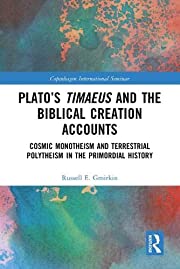Here is the thesis that Russell Gmirkin [RG] is buttressing in Plato’s Timaeus and the Biblical Creation Accounts:

The thesis has been the subject of earlier books that have been discussed in detail on this blog. In support of that interpretation RG analyses the Genesis creation chapter to demonstrate its relationship to Greek “philosophical” ideas and in particular, Plato’s Timaeus.
Anyone familiar with Timaeus will be immediately thinking, But Timaeus contains a very lengthy explanation of the origins of our cosmos and Genesis 1 is, well, extremely short. Yes, but Plato also said something else that is most pertinent to this discussion that is alluded to in the above quotation. Hear out RG. I will do my best to present his analysis and comparisons fairly and accurately.
The ancient Greek science context of Genesis
Ancient Greek science was a process of inferring how and why the observable world came about and worked the way it did but the idea of carrying out experiments to test ideas had to wait for a future time.
We have clear demarcations between the study of the origins of the universe and the study of the origins of societies. Not so ancient Greek thinkers. For them, the “history of nature” bracketed all in one course the question of the origins of the universe, of life, of humankind, of social institutions, of technologies, of political systems.
The questions they asked were:
- What was the nature and origin of the “stuff” from which the cosmos came about?
- What were the forces (e.g. floating and sinking, separation of matter by winnowing), and the origins of those forces, that acted on that “stuff” to cause it to behave the way it did?
- How did those forces cause the cosmos to come into existence?
The thinkers were not called “scientists”. Aristotle called them “students of nature” or “writers on nature” (see the Loeb edition of Aristotle’s Physics). Later authors called them “philosophers” and that’s the common label attached to them today. RG addresses the problematic state of the evidence for our knowledge of what these natural philosophers theorized but we do have some general ideas, however provisional, and he provides an interesting set of entries for them to enable us to get some idea of the intellectual context RG is arguing for Genesis 1. (The links are my own, of course, and not RG’s) Continue reading “Genesis = Science + Myth + Theology — [Biblical Creation Accounts/Plato’s Timaeus – 3a]”
